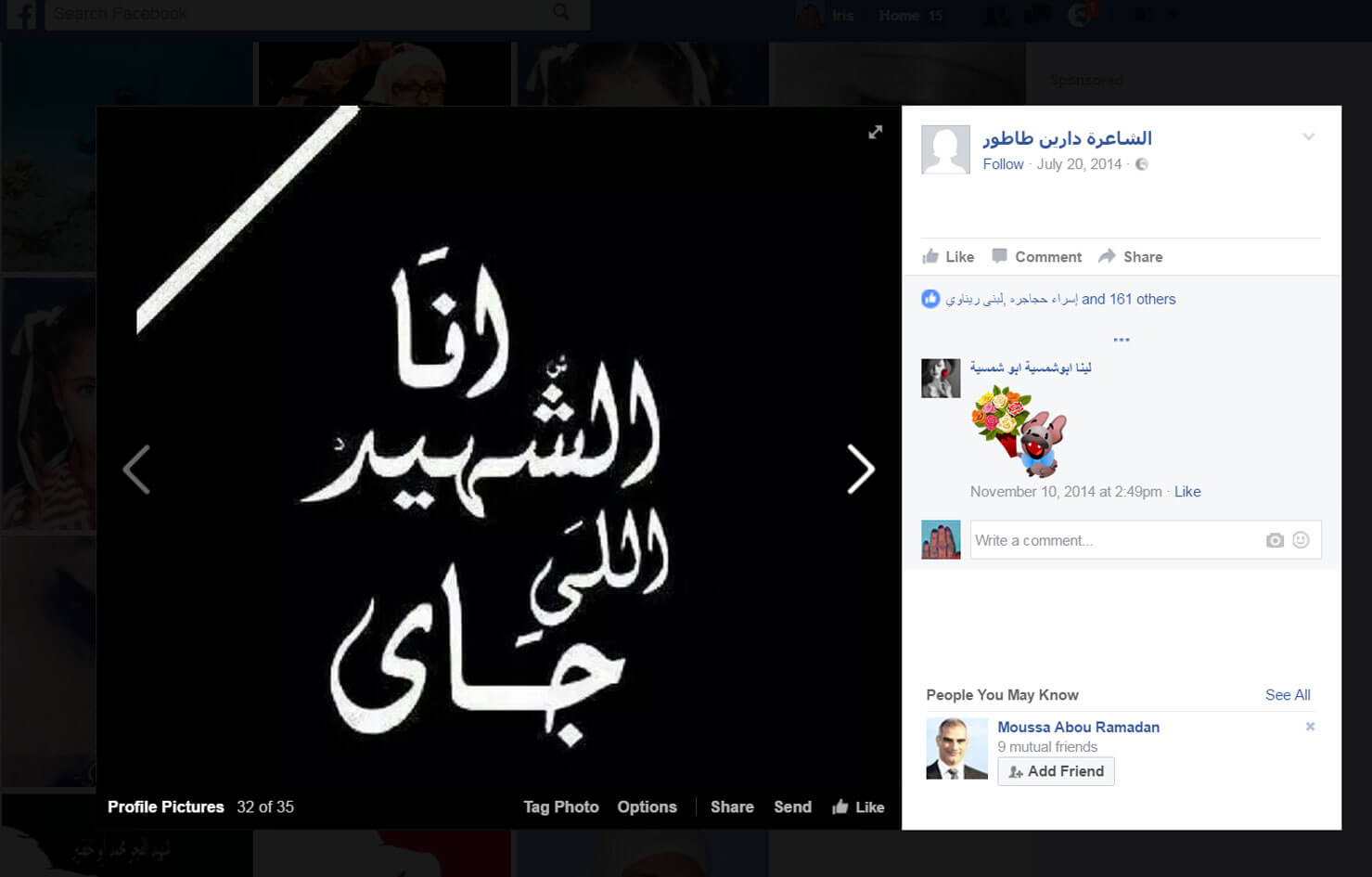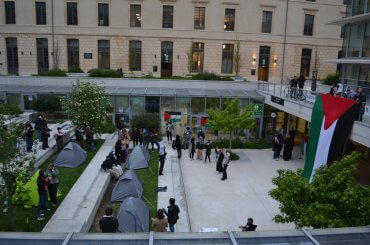“Sometimes they arrest you while you are committing a dream”
—Mahmoud Darwish
In a moment when much of the world’s population is justifiably alarmed at the ascent of a dangerous, bigoted demagogue to the White House, it’s a critical moment to recognize that the state of Israel has long been ruled by a similarly appalling regime that has legalized systems of racial apartheid; religious and ethnic profiling; theft of land and natural resources; and the tireless persecution of political dissent. In this outpost of a virulent strain of Trumpism, minority citizens are regularly harassed, censored, and arrested for exercising their freedom of speech.
Such is the outrageous case of the poet Dareen Tatour, a Palestinian citizen of Israel, who, even after a long, drawn-out ordeal, faces the possibility of eight years in prison for “incitement” and support to a terror organization–for a Youtube poetry video and two Facebook posts that denounce Israeli violence, racial profiling, and occupation. Though PEN International, other human rights organizations, and even Haaretz have denounced her prosecution as an egregious violation of her right to free speech, the state continues to vigorously pursue the charges. As the U.S. and Europe lean further toward an “Israelification” of social policy, we should keep a keen eye on the unfolding of this trial, and the hundreds of others like it, as it represents an escalation in the war on basic democratic rights.
In the latest round of hearings there have been a few encouraging developments. In November Tatour and her attorney, Gaby Lasky, were finally able to win a significant easing of the draconian terms of her house arrest. After more than a year of taxing legal battles and with the pressure of international solidarity campaigns, Tatour won the right to leave her house to go to work in Nazareth. She still must be accompanied by a “guardian” at all times, since her house arrest is extended between home and work, but she is no longer obliged to wear the G4S electronic ankle monitor. Tatour is still prohibited from all access to the internet.
Even these slightly more forgiving conditions represent a grave injustice considering the absence of any compelling case. During an astonishingly vacuous series of prosecutorial hearings that ended last September the lead prosecutor, Alina Hardak, failed to produce even one shred of evidence that the poet’s words incited anyone to do anything at all, much less acts of terrorism and violence. At this point, the charges should have been dropped, but were not. Since then, Tatour had the chance to testify in her own defense in three separate hearings on Nov. 17 and 23, 2016, and Jan. 26, 2017.
Tatour’s sworn testimony at those three hearings largely focused on illuminating the significance of the four “incriminating” items listed in the indictment, namely her Youtube video poem “Resist my people, Resist Them,” the Facebook status calling for intifada on behalf of al-Aqsa mosque, and a picture of Israa Abed a young Arab woman who was shot by soldiers in the bus station in Afula, accompanied by a profile picture reading: “I am the next martyr.”
Tatour and her attorney Gaby Lasky sought to demonstrate that the posts have been intentionally mistranslated and misinterpreted by police and the prosecution. In these hearings, Tatour took full responsibility for publishing the items listed in the indictment, as they were originally published in Arabic, but contested the ways that they have been mistranslated into Hebrew and misconstrued by the authorities.
The most important work under scrutiny was Dareen’s poem set to music and a classic “Intifada mix” of video footage of clashes between Israeli troops and Palestinian demonstrators. The video was shown in court as evidence of Tatour’s radical tendencies, though Tatour testified under oath that she wrote the poem not to advocate violence, but rather to protest the murders of innocent Palestinian civilians: Mohammed Abu Khdeir, a teenager who was burned to death in Jerusalem, Hadeel al-Hashlamoun who was shot at a checkpoint in al-Khalil (Hebron), and baby Ali Dawabsheh and his parents who were burned to death by settlers in their home in the West Bank village of Duma.
The problem of translating this poem became the central axis of the cross-examination. The prosecutor Alina Hardak attempted to undermine Tatour’s claim that the police translation was faulty by trying to induce Tatour to make specific comments about the poem in the Hebrew translation. Tatour resisted the ruse and explained the content of the poem in Arabic, but refused to comment on the Hebrew translation. The poet’s contention was that she didn’t know Hebrew well enough to translate poetry and that this was a job for professionals.
Tatour reiterated the defense’s intention to bring an expert translator, in contrast to the shoddy translation presented by the police completed by a policeman with no specialized knowledge of translation or literature. The prosecutor tried to force Tatour to read some of the verses of the poem in Arabic so that the court’s (likely faulty) translation of her words would be recorded in the transcripts as if they were the words of the poet. Lasky, the defense attorney, objected; and Judge Adi Bambiliya, who seemed to be enjoying the lively literary chaos, finally blocked the prosecution’s attempts to enter a translation into the record through the back door.

In addition to the poem, Tatour also testified concerning the meaning of the profile picture that read: “I am the next martyr.” Tatour explained that she was not alone in posting this meme. Many Facebook users have uploaded the image as their profile picture in protest of the killing of innocent people by the police. After the authorities killed Kheir Hamdan in Kufr Kana, many people posted a similar meme, which was also deployed in a response to the murder of another young man after a chase in the Fakhourah neighborhood in Nazareth. According to Tatour, the meme is meant to denounce the use of excessive force that has often amounted to cold-blooded executions. The police often aim their fire at the torso, and then prevent their victims from receiving medical care.
Tatour testified that she posted the image of Israa Abed, laying shot on the ground because she was shocked by the brutal shooting a young woman who hadn’t attacked anyone and who didn’t pose a threat to the officers who had surrounded her. As an Arab woman who travels to study and work wearing the hijab, Tatour felt that the shooting of Abed demonstrated how easily she herself could be wrongly targeted.

During the cross-examination, Tatour testified that the officers who originally interrogated her had twisted her words and claimed that she wrote, “I want to be a martyr,” whereas the slogan “I am the next martyr” was designed to express exactly the reverse: the need to stop the killing. Just as the Israeli soldiers suspected the unarmed Hadeel al-Hashlamoun and shot her, they might also suspect her for no reason and shoot her. “We have reached a situation,” Tatour testified, “where it is enough that somebody is suspected in order to shoot him.”
During the hearings, Tatour’s attorney Lasky asked her to explain the Facebook status that called for intifada on behalf of the al-Aqsa mosque. Tatour spoke about the restrictions on Muslims praying in the Jerusalem mosque and the struggle for freedom of worship. During the time when Tatour posted the update there had been numerous demonstrations demanding the right to pray in al-Aqsa, which culminated in a national demonstration organized by the Arab Follow-up Committee, a national umbrella organization of groups supporting the rights of Palestinian citizens of Israel. Tatour testified that she didn’t write the status herself, but copied and pasted it to her page as part of her support for a legitimate political struggle for religious rights. The post originated from an Islamic Jihad page where Tatour had shared one of their news blurbs, but Islamic Jihad was not the primary subject of the post. It did not occur to her that anyone could interpret this status as expressing support of a terrorist organization.
In the latest hearing on Jan. 26 2017, a heated exchanges erupted between the prosecutor, Hardak, and the defense attorney, Lasky. The prosecutor tried to force Tatour to admit that she sympathizes with the goals of Islamic Jihad and that she supports violence and “the knife intifada,” an increase in violence that reached its peak in 2015. The poet strongly refuted these claims, repeatedly denouncing the use of violence and reiterating her commitment to art and poetry. Lasky claimed that these charges are based, yet again, on misleading translations of the terms that Palestinians use to describe “intifada” (popular uprising) and “muqawama” (resistance).
The word “intifada” in Arabic became famous worldwide in 1987 when Palestinian resistance to the occupation was transformed from an armed struggle to a mass popular uprising, with people from all walks of life, including women and children, confronting occupation soldiers. The word “muqawama” can imply any type of resistance or struggle against oppression. Though neither of these two terms presupposes the use of violence, Israeli authorities are always quick to conflate the terms with “terrorism.” In the counter-examination the prosecutor repeatedly accused Tatour of explicitly calling for “a violent intifada,” even though the only violence explicitly mentioned in the texts was the violence committed by the Israeli military and the settlers. Tatour insisted that she only called for a legitimate popular struggle.
Tatour’s next hearing is scheduled to take place on March 19 and will be followed by two subsequent hearings in March and in April. At these proceedings, Judge Bambiliya will hear a series of witnesses for the defense, including an expert in translation from Arabic to Hebrew, an expert in literature, and a legal expert who will testify on what constitutes “incitement” in Israeli jurisprudence.
Throughout the trial, Tatour’s attorneys have argued that she has been treated in an abusive manner by the prosecutor and that the trial has been unreasonably long for a humble, unknown poet who simply posted a poem and some Facebook updates. Careful observers of this scandalous theater of the absurd will no doubt reach the same conclusion. This trial is living proof of the maxim that justice delayed is, in fact, justice denied.
Israel is often cited as an innovator and trailblazer on the world stage in the fields of business, high technology, and security. The case of Dareen Tatour signals that the Jewish state may be setting yet another exciting precedent with the invention of a brand new crime: “Posting While Arab.” With an overt racist and Islamophobe in the White House who has unleashed and empowered some of the most unsavory and racist elements in U.S. society, we need to keep up the pressure on behalf of Dareen Tatour and her counterparts—not only for their sakes, but for the sake of preserving and extending basic human rights that are clearly at risk of eroding worldwide.
Journalist and author Ofra Yeshua-Lyth also contributed to this article.



Sorry to have to say it, but this trial is a farce.
Disgusting.
Reminds me of trials long ago, Judge Roland Freisler presiding.